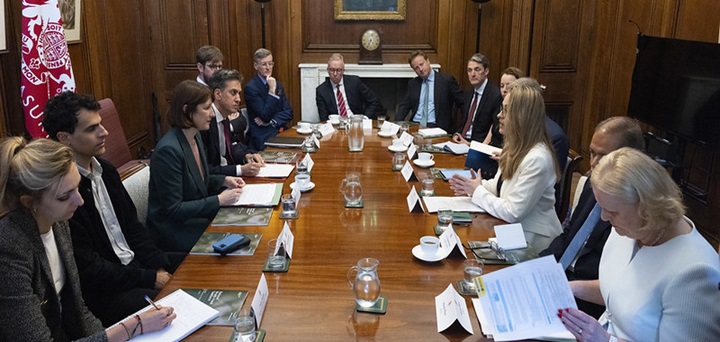Just days after taking office, the newly appointed Labour government has unveiled detailed plans for a £7.3bn National Wealth Fund aimed at attracting institutional investment in the UK’s energy transition.
 The announcement was made following a high-level meeting at Downing Street, led by Chancellor Rachel Reeves and Ed Miliband, Secretary of State for the Department for Energy Security and Net Zero. The taskforce includes Brunel Pension Partnership CIO David Vickers, Brookfield Asset Management chair Mark Carney, Barclays CEO C.S. Venkatakrishnan, and Aviva CEO Dame Amanda Blanc.
The announcement was made following a high-level meeting at Downing Street, led by Chancellor Rachel Reeves and Ed Miliband, Secretary of State for the Department for Energy Security and Net Zero. The taskforce includes Brunel Pension Partnership CIO David Vickers, Brookfield Asset Management chair Mark Carney, Barclays CEO C.S. Venkatakrishnan, and Aviva CEO Dame Amanda Blanc.
By committing £7 .3 bn of public funds, the government aims to leverage an additional £21bn in private investment. The taskforce’s initial report outlines that the fund’s investment priorities will be guided by a strategic investment mandate aligned with the UK’s industrial strategy. The focus will be on areas with significant decarbonisation opportunities and funding gaps, including green steel production, gigafactories, green hydrogen, and port investments.
David Vickers highlighted the fund’s potential to enhance the investment landscape for the UK’s energy transition. “Building a green economy requires a step-change in coordination between the government and investors, ensuring the policy and regulatory environment supports long-term investments,” said Vickers. “The National Wealth Fund comes at a crucial moment to help set that course.”
The government also plans to review the role of the British Business Bank to leverage its investment pipeline and track record as the UK’s largest venture capital investor. The new fund aims to be self-funding, targeting a return aligned with long-term gilts, with individual assets priced according to risk.
Louis Taylor, CEO of the British Business Bank, welcomed the fund. “We expect the National Wealth Fund to create a coherent governmental offer for businesses and a compelling proposition for investors. This will help mobilise billions in private investment, leveraging our scale, networks, and track record,” he said.
The initiative also received support from the PLSA, which has previously advocated for a greater involvement of the British Business Bank in developing a venture capital pipeline for pension funds. Nigel Peaple, director of Policy and Advocacy, stated, “We welcome the government’s decisive plans for a National Wealth Fund and look forward to developing solutions that benefit savers, pension funds, and the economy.”
However, there was also scepticism towards the initiative. Labour-affiliated House of Lords member Barron Sikka cautioned against repeating past mistakes with private finance initiatives. “While I welcome any investment, the approach resembles the failed PFIs where the government provided more capital than the private sector. It might be better for the government to fund these investments from its own resources,” Sikka told Room151. He suggested that increasing capital gains tax and taxes on dividends could raise the targeted £21bn in private investments.
Sikka emphasised that he supports pension funds investing in infrastructure but is concerned about using public money to underwrite investment risks.
Further details on the fund could be released at the King’s speech later this month. The government said it will bring forward new legislation when parliamentary time allows to cement the fund in statute.













